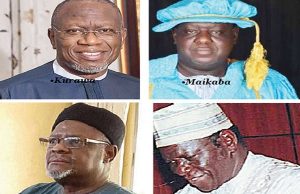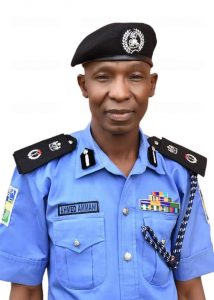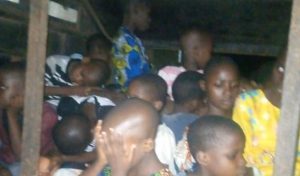Two weeks ago, Prof Aliyu Dikko of the Department of Physiology, Bayero University Kano, called one of his friends who is a writer and columnist, Dr Aliyu Tilde, asking him about his health.
Tilde, who resides in Bauchi, had gone for COVID-19 test and told to self-isolate, a situation that prompted Dikko to call him to know how he was doing.
Unknown to Tilde, that conversation would be one of the last he would ever have with his professor friend, because last Friday, Dikko succumbed to an ‘unknown illness’ which has gripped Kano State in recent time.
Penning a eulogy to Dikko on his Facebook wall, Tilde wrote on April 25, “Last night (April 24), I lost a dear friend with whom we braved those difficult years as lecturers at Usmanu Danfodiyo University, Sokoto. Though a year ahead of me in class and much more in age, we graduated from the same Department of Biological Sciences, Ahmadu Bello University, Zaria in 1981 and 1982 respectively.
“Dikko, as we often called him, moved to medicine where he became a professor of physiology and also a Deputy Vice-Chancellor of BUK in the mid-2000s.
“Two weeks ago when he heard that we were asked to go for COVID-19 test and self-isolate after our Governor (Bala Mohammed) tested positive, he (Dikko) called to ask of my health condition: ‘Tilde, how are you?’ He shouted on the phone, as usual, full of energy. ‘I am doing fine, sir,’ I replied. He then said, ‘Speak to your daughter personally to assure her that you are well.’ He handed over the phone to his daughter and we greeted.
“Unknown to us, death was on his way. Yesterday (April 24), he succumbed to the ‘unknown illness’ that has been ravaging Kano.”
Tilde described the deceased as “an amusing personality and I have always been a subject of his jokes, finding me very unconventional in those days.”
Because of the manner in which the don died, Tilde said there was the need for the Federal Government to “take over the affairs of Kano in regard to COVID-19 campaign.
“Something needs to be done and must be done; otherwise, no state in the North-West and North-East will be free of the merciless onslaught of the virus. Clearly, the situation has overwhelmed the state government. The city is too big and our social configuration and attitude are making matters worse,” he wrote.
Dikko was among the scores of elite and prominent people who have lost their lives to a yet-to-be-identified disease, which has mostly hit areas such as Dala, Fagge, Tarauni, Nasarawa, Gwale, and Kano Municipal.
Barely two days after the don’s death, another professor – of the Department of Mass Communication – at BUK, Balarabe Maikaba, also succumbed to the ‘strange’ illness.
A funeral prayer was said to have been held for the deceased on the same day at his family house, near Plaza Cinema, Fagge quarters in Kano city.
Maikaba, whose career objective was to “reposition mass communication education and training,” according to his LinkedIn profile, also had many tributes paid to him on social media.
“I just literally woke up to the deeply troubling news of the death of Bayero University Kano’s Professor Balarabe Maikaba, who taught me research methods and statistics in mass communication in the early and mid-1990s.
“The frighteningly unfolding tragedy in Kano that has seen scores of people dying ‘mysteriously’ and ‘suddenly’ has now hit me personally. Professor Maikaba loved the quantitative dimensions of mass communication studies, which I dreaded – and still do,” Farooq Kperogi, an Associate Professor of Journalism & Emerging Media at the Kennesaw State University, Georgia, the United States, wrote on Twitter.
Before his death, Maikaba posted only seven times since he joined Twitter in June 2018. His last tweet via his handle @PMaikaba was dated December 12, 2018 and promoted a book on coping with diabetes.
Also, last Saturday, another prominent academic in Kano State, Dr Sabo Kurawa, died after a brief illness. Aged 75, Kurawa was said to be one of the pioneering founders of the Department of Sociology and a former Deputy Vice-Chancellor at BUK.
Reacting to the deaths, the Pro-Chancellor and Chairman of the Governing Council, BUK, Prof Ibrahim Gambari, described the deceased as “colleagues whose services were highly valued and hugely needed in BUK.”
“Indeed, all of them were quintessential resource persons and byword for scholastic accomplishments who made notable contributions to the development of the university.
“My heart goes to their families, relations, friends and the entire university community. We have, indeed, lost illustrious colleagues,” Gambari said in a statement shared on the official Facebook page of BUK.
However, the deaths–arising from what residents described as ‘strange ailments’–have left many worried.
One of the casualties was Prof Ibrahim Ayagi, a foremost economist in the country.
Ayagi, who also died of a ‘strange illness’ in Kano last week at 80, was said to be a prominent face during the Structural Adjustment Programme debates in the mid-1980s and was once appointed by former President Olusegun Obasanjo as the Chairman of the National Economic Intelligence Committee.
When Mustapha Darma, a Kano State indigene who resides in Jubail, a city in the Eastern province on the Persian Gulf coast of Saudi Arabia, heard of the don’s death, he wrote on Facebook, “There was a man.”
Another prominent person who lost his life in the past few days in Kano was Alhaji Dahiru Rabiu, who was a former Grand Khadi (judge of the Sharia Court of Appeal) in the state.
Lamenting Rabiu’s death on Facebook, a former Chief Executive Officer/Managing Director at Unity Bank Plc in Abuja, Rislanudeen Muhammad, wrote on April 25, “Today, I lost my closest senior cousin, Alhaji Dahiru Rabiu Danbappa, former Grand Khadi of Kano State.
“On the same day, I lost another senior cousin, Hajia Nene Umma, and a young niece, Shamsiyya Mustapha Danbappa. They were all buried the same time earlier today in Kano city. May Allah have mercy on their souls, forgive them and admit them into Aljannah Firdaus, Ameen.”
More high-profile persons who have succumbed to the strange illness in the past few days in the state are Dr Musa Umar Gwarzo; Mallam Nasir Maikano Bichi; Musa Tijjani (Editor of Kano-based Triumph Newspaper); and Adamu Isyaku Dal, a former Executive Secretary of the State Universal Basic Education Board. Others are Alhaji Salisu Lado, Hajiya Shamsiyya Mustapha, Hajiyaj Nene Umma, Alhaji Garba Sarki Fagge, Dr Nasiru Maikano Bichi, and Ado Gwanja’s mother, among others.
Multiple deaths amid COVID-19 pandemic
Kano State recorded its first COVID-19 case on April 11 when a retired ambassador, who had gone on a trip to the United Kingdom, was diagnosed with the coronavirus.
By the time of filing this report on Thursday, the state had recorded 139 COVID-19 cases, trailing behind the Federal Capital Territory, 174; and Lagos State, 931.
According to the Nigeria Centre for Disease Control, of the 51 deaths recorded countrywide, Kano accounted for three.
But as the country is busy fighting the deadly coronavirus pandemic, Kano has in the past two weeks been witnessing a series of mysterious deaths, including high-profile personalities such as academics, bankers, administrators and businessmen.
Although there is no official record of the death toll, with many worrying the deaths could be as a result of the coronavirus.
A former Kano State governor, Rabiu Kwankwaso, in a letter to the President, Major General Muhammadu Buhari (retd), also alleged that COVID-19 was responsible for the deaths, claiming that the absence of a testing centre in the Kano had made many people resort to “self-help.”
He also claimed that those who died in the state contracted the COVID-19 from persons who were positive but unaware.
“Looking at the pattern elsewhere in the world where senior citizens with preexisting conditions were the main fatalities of the novel coronavirus, we are concerned that the inability to conduct tests in the state to determine the status of these senior citizens might be responsible for their death,” Kwankwaso’s viral letter read in part.
However, the state government dismissed that the deaths were related to COVID-19.
The state Commissioner for Information, Muhammad Garba, in a statement on Sunday, said the recent deaths in the state were caused by “complications arising from hypertension, diabetes, meningitis and acute malaria.”
He said, “Although an investigation into the cause of the deaths is still ongoing, preliminary reports from the state Ministry of Health indicated that the deaths are not connected to the COVID-19 pandemic. Reports have shown that most of the deaths were caused by complications arising from hypertension, diabetes, meningitis, and acute malaria.
“Moreso, the state government has three modern isolation centres where those tested positive to COVID-19 are being cared for. We are also hopeful of getting an additional two isolation centres soonest. The government has also hired a hotel where suspected cases are accommodated.”
Although the state Governor Abdullahi Ganduje had previously ordered a lockdown in the state for one week, the President, in a nationwide televised broadcast on Monday expressed deep concern over the high number of unexplained deaths in the state.
Consequently, Buhari imposed a lockdown in the state for an additional two weeks, saying, “The Federal Government shall deploy all the necessary human, material and technical resources to support the state in controlling and containing the pandemic and preventing the risk of further spread to neighbouring states.”
Earlier, Ganduje, in an interview with the BBC Hausa Service, accused the Federal Government of neglecting the state in its current battle against the coronavirus spread.
“We are in a serious problem. I can tell you the situation is really bad and scary because what we solely rely on in fighting the disease is the testing centre,” he said.
“The laboratory suspended its operation five or six days ago. There is also a shortage of sample collection equipment. It is not common equipment that you can go and buy in the market. Those whose samples were collected are still waiting to know their fate,” the governor lamented.
Ganduje also directed the state Ministry of Health to conduct ‘verbal autopsy’ of those who lost their lives to various strange ailments in the past few days.
However, the NCDC on Tuesday reopened the testing laboratory for COVID-19 in Kano State, adding that a second testing laboratory would be activated during the week at Bayero University Kano.
Autopsy will unravel cause of deaths –Experts
A Professor of Microbiology at the Faculty of Science, Lagos State University, Olusegun Akinyemi, said there was nothing mysterious about the deaths in Kano.
Though he noted that investigations were ongoing, he said COVID-19 was likely responsible for the deaths.
He said, “I don’t believe in what is called mysterious death. It was in the olden days that you could ascribe death to a mystery or witchcraft. Today, technology has advanced and that is why there is nothing called a mysterious death. We have to look for the organism responsible for the illness and death to know what is going on.
“Personally, I believe it is COVID-19 that is causing deaths in Kano. But all the same, let’s wait for an autopsy to know what is responsible for the deaths.
“Thankfully, the NCDC and the Ministry of Health experts have taken a proactive step to unravel the cause of the unfortunate circumstances. So when investigations are through, it might be that COVID-19 is responsible for the deaths recorded.”
Recalling how some Almajiris deported from Kano to Kaduna were said to have tested positive for COVID-19, Akinyemi said, “This tells you that COVID-19 is circulating in that region and might have caused the deaths.”
The Kano State Chairman, Nigerian Medical Association, Dr Sanusi Bala, also told our correspondent investigations would unravel the circumstances that led to the deaths in the state.
He told our correspondent on the phone, “We are working with the state government to carry out the autopsy of the deaths to know the likely cause of the deaths to be able to manage the situation. We believe the NCDC, the federal and state ministries of health have a formidable team to unravel the cause of these deaths.”
Also, Bala said as frontline workers, members of the state chapter of the NMA, had come up with ways to manage COVID-19 in the state, saying there would be positive changes soon.
He added, “We have also met with the government to provide the necessary equipment to protect ourselves while fighting the pandemic. We want to fight the coronavirus and we believe we will win.”
The state Commissioner for Health, Dr Aminu Tsanyawa, did not respond to our correspondent’s calls on Thursday. A text message sent to him had also not been responded to as of press time.
Meanwhile, a public health expert based in Kano, Dr Mustapha Garba, advised the residents on preventing the spread of infectious diseases in the state.
He noted that the deaths in the state might be due to COVID-19 or other infectious diseases, saying the earlier the people embarked on preventive measures, the better.
He stated, “People should wash their hands often. This is especially important before and after preparing food, before eating and after using the toilet. They should also observe other rules such as social distancing, covering of face with masks, use of hand sanitiser where soap and running water are not available. Most importantly, they should stay at home if they have signs and symptoms of an infection such as vomiting, diarrhoea or high fever.”









